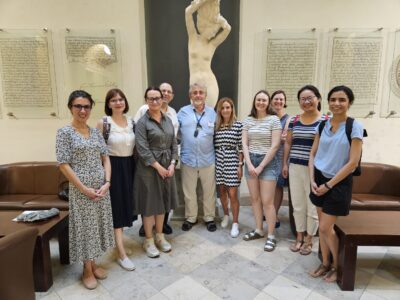The conference opened with welcome speeches from Gabriella Bednárikné Dörnyei, Dean of the Faculty of Health Sciences at Semmelweis University; Jesús García Laborda, AELFE President; as well as Katalin Fogarasi, Conference Chair and Director of the Institute of Languages for Specific Purposes.
The first plenary session featured Dr. Stefania M. Maci from the University of Bergamo, who discussed the impact of AI on specialized translation, highlighting how artificial intelligence is transforming the landscape of language services in professional and academic fields.
Following the lunch break, Dr. István Kecskés from the University of Albany, USA, presented an online plenary titled “Face-to-face intercultural communication and mediated intercultural communication as related to health communication.” His exploration of intercultural dynamics in healthcare provided the audience with practical insights into improving patient-practitioner communication across cultures.
In the afternoon, Dr. Carmen Sancho Guinda from the Technical University of Madrid addressed the concept of brevity in academic discourse with her talk titled “Is brevity really the soul of wit?”. Her exploration of extreme abstracts in ESP classrooms was thought-provoking, shedding light on the pedagogical value of concise academic writing.
Rounding off the first day of the conference, Dr. Ágota Fóris from Károli Gáspár University of the Reformed Church in Hungary delivered a plenary session on professional communication, terminology, and documentation, focusing on knowledge sharing and information management in professional contexts.
On September 7, the morning began with a plenary roundtable discussion chaired by Dr. Ruth Breeze from the University of Navarra, Spain. The panel included several prominent scholars such as Francisco J. Alonso-Almeida and Carmen Sancho Guinda, who talked about their respective journals, sharing insights from their publishing experiences, which sparked an exciting and engaging discussion with the audience.
The poster session, held in the foyer, showcased innovative research from participants. Posters covered a wide range of topics, from the use of AI in language teaching to medical communication.
The parallel sessions provided participants with a rich variety of topics and discussions, highlighting key areas in LSP.
These sessions covered diverse themes, such as healthcare and legal communication, the integration of artificial intelligence in LSP, or teaching methodologies.
Participants could choose from engaging presentations that explored both theoretical perspectives and practical applications, making these sessions highly engaging for researchers and instructors alike.
The 22nd AELFE Conference was a resounding success, providing a rich platform for academic exchange on the interprofessional research of language, technology, and professional communication. With contributions from esteemed researchers and the discussions on LSP challenges, the event reinforced the importance of collaboration in advancing language education in specialized fields. The conference concluded with a city tour, allowing participants to explore the cultural heritage of Budapest while continuing the enriching discussions from the conference.
Judit Császár – Institute of Languages for Specific Purposes
Photos by Bálint Barta, Boglárka Zellei – Semmelweis University


















